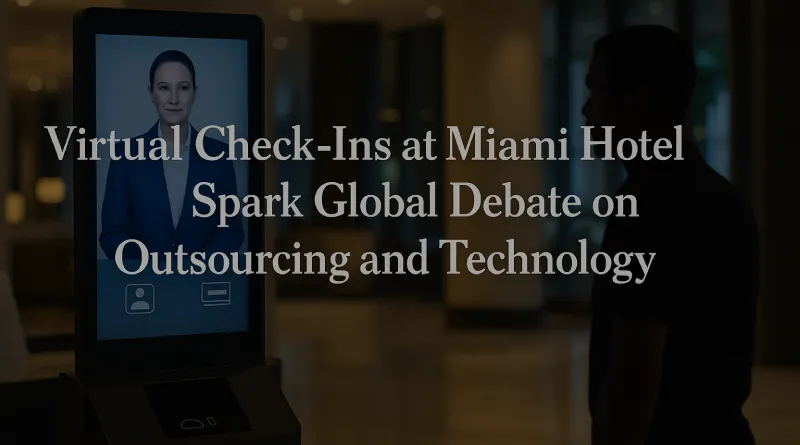Virtual Check-Ins at Miami Hotel Spark Global Debate on Outsourcing and Technology
An out-of-control outrage video published by the La Quinta Inn in Miami and later posted by TikTok user Pete Langs (@languageguy1) has sparked a raging controversy over outsourcing and technological practice in the hospitality industry. In the video, a visitor arriving is found checking in through a video call with a presumably Indian virtual receptionist and has elicited invention acclaim and a backlash over loss of employment. In 2021-22, the Indian IT and BPO industry was worth an IRS value of 254.4 billion, and in 2023, 70 percent of H-1B visas issued by the U.S. were to Indian technicians, and this shows how far-reaching Indian skilled labor is and how it has been causing friction all over the planet.
The video, achieving more than 1.74 million Instagram views, presents the receptionist telling Langs how to check in and asking questions like, “Do you need one or two room keys?” and creating electronic forms. Some, such as X user @Dhruv, describe it as effective as “wonderful”; others, such as @WallStreetApes, require the legislation against outsourcing, citing, “If you make it in America, hire it in America.” This indicates American anxieties, as the population of the foreign-born labor force declined 7.35 lakhs since January 2025, according to NFAP analysis.
In India, the role of virtual receptionists is catching on, as occurs in Olive by Embassy hotels in Bengaluru, where Ananya Narang, the CEO, recently experienced a characteristic such as a case of peak Bengaluru, with remote working in multiple hotels running across video. It is a cost-saving model that looks at using technology as Olive patented to increase its efficiency but at the expense of losing the human aspect of hospitality, which is vital in India, which has a tourism sector of $40 billion, according to IBEF. Critics of X, such as @VinayAravind, say it makes people worse off as customers and employees; defenders say it gives people living in rural areas the ability to do remote work.
The discussion highlights a larger trend where 59 percent of U.S. companies outsource to India to save money, according to Deloitte, but that automation and AI might kill jobs everywhere, too. Such innovations have the potential to open up opportunities in India, where 50 percent of workers are in the service sector according to the World Bank, but at the same time may alienate guests who prefer physical contact. Hotels have to meet a culturally diverse market like India and the U.S. An efficient hotel has to consider measures that ensure customer satisfaction.
Disclaimer
The information presented in this blog is derived from publicly available sources for general use, including any cited references. While we strive to mention credible sources whenever possible, Web Techneeq – Web Development Agency in Mumbai does not guarantee the accuracy of the information provided in any way. This article is intended solely for general informational purposes. It should be understood that it does not constitute legal advice and does not aim to serve as such. If any individual(s) make decisions based on the information in this article without verifying the facts, we explicitly reject any liability that may arise as a result. We recommend that readers seek separate guidance regarding any specific information provided here.

